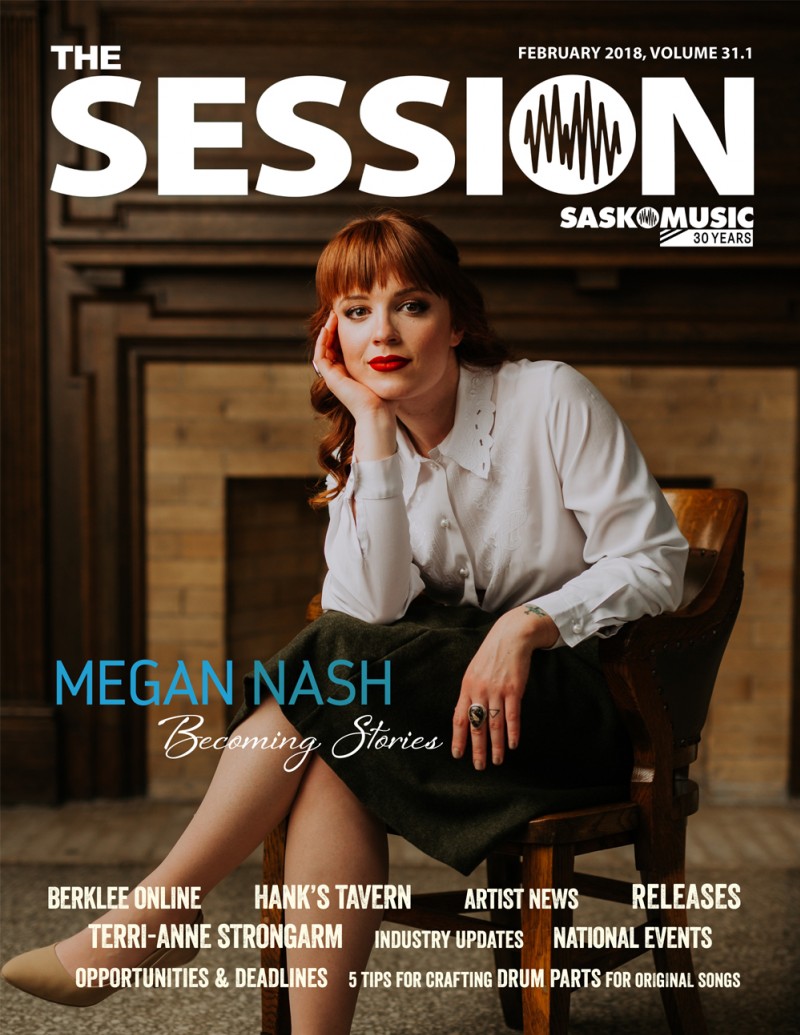Photography by Chris Graham for The Session
I met Megan the first time when she was a performer in the CKRM Big Country Talent Show. The long-running contest* showcases aspiring country singers in a format that sees many participants introduced to their first taste of being on stage and in front of an audience. For many, that 10 minutes onstage was all it took to hook them into the pursuit of music. A stream of now-professional country artists, among them JUNO and CCMA Award-winners, came through its ranks. Myself being part of the house band backing up the 25 or so competing artists that year, the young Megan left an impression with a number of qualities: a fiery redhead with tons of energy, endearing, charismatic, and one of the few teenagers who had the guts to perform an original song. Although she was raw, even then she stood out.
*Now repositioned as the CKRM Proudly Saskatchewan Showcase and focusing on solo and duo performers.
Fast-forward a decade-ish and we find Megan as a mature, confident and passionate performer who manages to captivate audiences with as little as her voice, a guitar, and some thoughtfully chosen words. There’s been a steady progression in her career and creative growth that has been gratifying to watch, even from the outside. She released a couple of projects before coming out with the critically acclaimed “Song Harvest Volume One” in 2015, a tome of simplicity (just Megan and her guitar recorded in a old church), garnering her a Western Canadian Music Award nomination for Songwriter of the Year. Her new album “Seeker” (released November 2017 on Acronym Records) represents a marked departure in sound, if not songwriting style, with Megan utilizing the full band complement of Bears in Hazenmore. It has quickly helped propel Megan’s career to a new high, with prestigious showcase offers for international festivals including Reeperbahn (this past September) and the upcoming Focus Wales and The Great Escape in the U.K.; 100,000 streams of track “Salted Salamanders” on Spotify; and being named the Best Saskatchewan Album of 2017 by the general public through our SaskMusic poll, to name a few highlights.
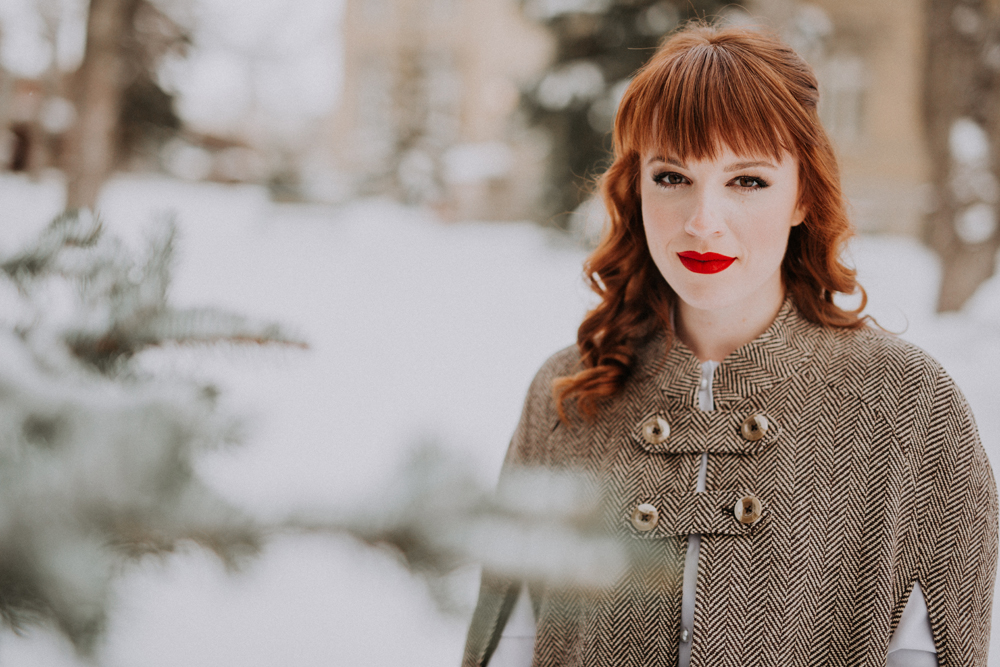
The Session: Some of your early years of music were spent within a more standard country genre. Was your place in that style of music somewhat a product of your rural surroundings and your parents’ influence?
Megan: It was those influences, but also I was swayed by what my peers liked; at one point I wanted to fit in. I also listened to a lot of classic rock growing up. When I was about 14 I got my first guitar, and I played a lot of AC/DC riffs in the basement, played in rock bands. Then I was ill for a couple years and didn’t play music at all. When the music came back to me it was from a songwriter’s perspective – and that sort of lent itself to country music. I think country is really about the lyrics and the song, and I found myself gravitating to that.
When you think of your lyrics now, would you say they’re still country-influenced in the sense that there are themes, and they have a fluid thread through the lyric?
I think I’m still in that country genre somewhere. Alt country. At least I think other people think I’m alt country. I was surprised when the label chose to release Seeker as Alternative. I’ve always used that singer/songwriter label, since I left ‘country’ and consciously wasn’t going down that commercial country road.
You were doing country gigs before singer/songwriter ones?
Oh ya. I was playing washboard in a band at one point! But that might be best left in 2009.
How young were you when you first started gigging?
I think because when I started I was playing the popular genre for the community, I landed gigs pretty much right away. I started writing songs in 2006 and was playing them live by 2007. I think I started seriously right out of high school.
So you’re about 10 years invested now. Did you ever, after high school, have another career path in mind or was it always music?
I don’t even know how I thought I could do it, but, I wanted a career in music. I went to an extended-learning songwriting course through the University of Saskatchewan in my Grade 12 year, that spring. I met Kim Fontaine, Jay Semko and David J Taylor there, who became huge influences for me. I worked with David a number of times after that.
What was the best part of that experience – technical knowledge? confidence? inspiration?
It was definitely confidence-building. Back then, my parents did not want me to pursue anything like music. But I was just so headstrong. From that U of S course it was nice to learn how to critically think about songs, the nuts and bolts of them. Even more so, I was hearing about the lifestyle of a songwriter that allowed them to write songs. I was inspired to try to create a life that I (would) love, and to be able to write a lot. Kim talked about the idea of basing yourself in rural Sask. as a writer, and I thought that was really interesting.
Do you remember the first song you wrote that you thought was good enough to perform? Have you ever struggled with the mechanics of songwriting?
I think I listened to a lot of radio at the start – ‘80s pop songs, and country radio. They’re very structured formats and I learned how to write from hearing those songs. Though there have been a couple songs I’ve written over the years that I’d like to bury now (laughs).
So you’ve never really thought of doing anything else. Have you got a goal point in mind that you’d like to see yourself reach? Is there an artist whose career resembles what you ultimately aspire to?
I think about my lifestyle a lot. What kind of shows I’d like to be playing, and what kind of songs I’d like to be writing. I would really love to be playing more concert-style venues, soft seaters. I would love to be playing listening rooms in Europe, Canada, and the States too.
A big part for me, of being able to do this full time and to be able to keep on pursuing it, is celebrating the successes as they come. Just to acknowledge. It’s almost like an act of self-care – I remind myself ‘hey, you’re doing it, you’re doing well, keep going.’ Otherwise you could just burn yourself out when you don’t see yourself playing the ideal rooms across the country. I think it’s an easy career to get discouraged in. That’s a loaded statement, isn’t it? But I feel like I’ve been pretty good at acknowledging, and then saying ‘what’s next.’ Finding that balance.
I really enjoy writing songs, and I find a lot of joy in that. It’s very therapeutic. That why I do (music) at all - so I can afford to write songs. I wanna be writing songs that, when I’m 70 or 80 and reflecting on my earlier years, I can listen to them and think I did a good job of documenting my time. It’s very self-indulgent. But why not be? I’ve always looked forward to being really old. (laughs). There’s a privilege in that - getting to be old. I wanna look back on my work and think ‘oh, I remember that summer, and I did a good job keeping a record of that.’ I can show my grandkids. My family is really important to me. My dear friend, my grandma, passed away and I now wish I had more of her. I hope one day someone cares that much about me, that they want to have those stories.
How does performing fit in to your goals? If you didn’t have to perform live and could just write - would you?
I don’t know, I’m pretty addicted to the performing rush. You have those shows where it’s pure magic and something really weird and memorable happens, and you think, everyone here tonight is gonna remember that. I’m never gonna forget that. Those ones are so special. I think I’d miss performing a lot, even just for the random things that can happen live. I’ve got other streams of income going too – for example people send me their stories, and I come up with songs for them.
You recently showcased at Reeperbahn in German and toured a bit in Europe. How did you find your overseas performance experiences, as compared to playing in Saskatchewan?
People say it must be so different, but my brain is actually wired to look for things that are similar. There were some shows that I thought, this feels just like shows I’ve had in rural Sask. There are those communities that are just really grateful that you’re there – I felt that in Europe. Of course, I also played some regular noisy bars over there!
To be honest though, Canada doesn’t suck for touring. There are long drives you have to do in Europe, too. And you need to find the right places play. A lot of people say, “Wasn’t it amazing over there?” But it is here too! Go play a small town and see how they treat you. You get treated like gold a lot of places here. Rural centres have a lot to offer if you’re willing to make the drive.
I had a great Reeperbahn experience. My only complaint is their coffees are little. Before I went, I went for coffee with Poor Nameless Boy, who had done a very similar tour, and he filled me in on everything and gave me tips, such as about the tiny coffees (laughs). But I think that kind of speaks to our music community, how we want to support and encourage each other.
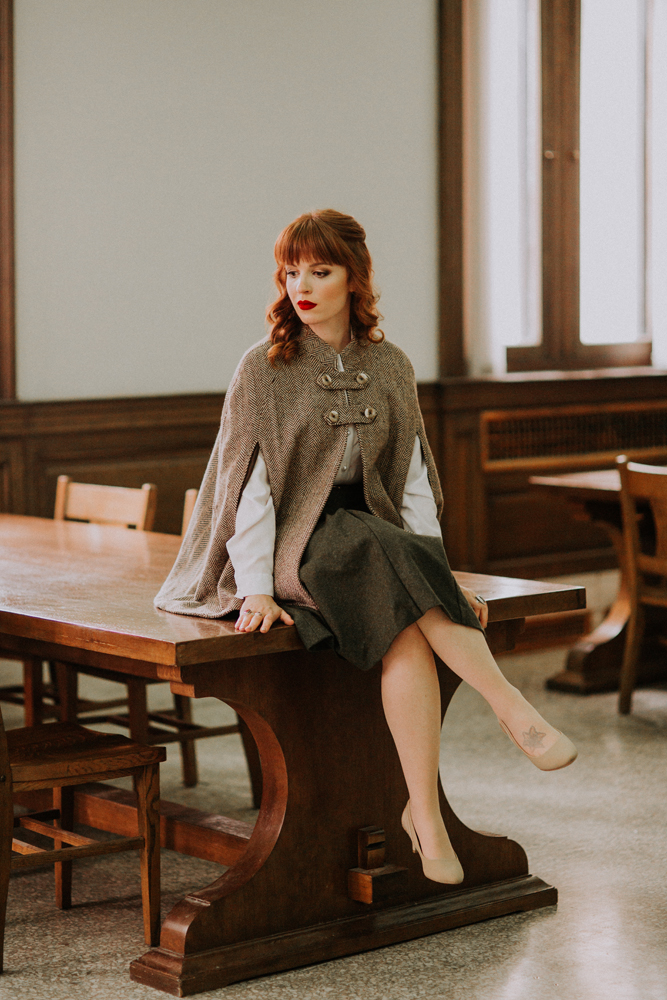 Can you talk about how your relationship with Acronym Records came about?
Can you talk about how your relationship with Acronym Records came about?
I first started playing with Bears in Hazenmore when they had me out for the Swift Current music camp, then we decided to play BreakOut West together, then we decided to go on the road, and this included a showcase in Toronto. Tony (Tarleton) came out to that and did the label guy thing where he left as soon as the show was done (laughs). I didn’t know at the time that they were planning to start a new division under MDM Recordings Inc. I’m really grateful to be the artist Acronym relaunched with.
It’s been really interesting to have representation for the first time ever. Having a champion in my corner, especially someone who is based in a large centre, is a big bonus. I really want to keep Saskatchewan as my home base. To be able to retreat back here is something I really love. I prioritize what’s best for my mental health and my creativity and I love the seclusion of where I live and write.
Is it that you feel more grounded here, and less prone to be swayed by outside influences or competition?
I love going to music conferences, and seeing what other people do, because I think there’s enough room for everybody. Another person’s success isn’t going to take away from mine, there’s enough joy and success to go around, there’s a lot of people, and there’s a lot of niche markets. I would much rather help others and build each other up. That’s what I like about Saskatchewan’s scene too.
I think what would freak me out about a big city is the infrastructure…tall buildings and such…I like being close to nature.
I also don’t want to get sucked into the who’s who because it’s so easy to go out every night where there’s something to do. But I have to focus on my own work too. It’s so inspiring to go to other peoples’ shows, but I don’t want to go out every night.
The Bears in Hazenmore collaboration: was that at first a ‘let’s try this out’ idea, and it ended up being great?
They started out arranging a few songs for me, and it was really fun. I knew I would need a band at some point; I didn’t want to be the tweener act forever. In hindsight, it was ambitious of us having that first show together at a BreakOut West showcase, but that’s why we did it. We wanted that local buzz behind us for other people to pick up on. That first full band as a showcase? Yes. It paid off. The subsequent tour to Ontario was with the help of the Saskatchewan Arts Board, and that tour basically got me the record deal. Incubate on the prairies, balanced by needing to get to Toronto now a little more often.
Have you been all the way west, and all the way east now?
I’ve never played Nunavut, or Newfoundland. I hate that I haven’t played there yet.
Are you looking to expand more into the U.S., especially playing the festivals?
I’ve always felt kind of on-the-fringe genre-wise for playing folk fests, but I also played a solo set at MerleFest this year. I’m not opposed to whatever world wants to take me!
Tell me a bit about your artistic and songwriter influences.
Begonia, she’s great. Love Mo Kenny (editor: and Megan just played with her at Winterruption). There are lots of great Canadian female artists right now. I really admire Neko Case’s body of work. Her “Calling Cards” is among my favourite songs. As well as Deana Carter’s “Strawberry Wine,” that’s a song that is so well written and still holds up.
I like artists who do a lot of collaboration, and I want to do more of that in the future too. I need to focus on doing good work.
I’m fortunate to have reached some personal milestones already. Doing what I do full time? My 17 year old self would say I’ve made it. I would love to be playing (consistently) to nice-sized crowds in theatres, I’d love to hit a million streams on Spotify - that’s a new thing now. I want to go forward and write more, and be able to afford to take time off sometimes as well. The idea of success, for me, would be able to afford to take some time off eventually so I could start a family.
That’s a valid concern for a female artist. It really takes a village to be a working, especially touring, female artist with a baby (we chat about this for a while).
I just want to keep writing and making records. Being able to go into a studio and record your songs, and have other people be a part of it, that’s great right there. If I can keep on doing that, that’d be great. And hopefully people keep coming to the shows. That’s really nice.
How do you view your progression over the last year or two? Do you feel the momentum that others see?
I see it. I do, I check numbers, growth, and the label’s really helped with tracking that. I think if I was currently also writing songs and feeling that new song high, I’d really be ‘Yes!’ I know my career is going in a positive way but I’ve also been so busy and feel the need to take time to write, as I’ve been on constant run of shows, over 100 this year. That’s along with booking and promoting myself, a lot of admin stuff, as I still do my own tour managing. I need to take time to write and then I’ll get that really rewarding feeling. I have to be gentle with myself, I used to be able to write while on the road, but now there’s too many things going on. It’s mentally exhausting.
What period were you recording through?
We recorded the album in chunks, mainly for financial reasons, and creative reasons too. I was going into the studio right at the time when (some funding programs) ended up closing, but the train was already moving and there was no way I was going halt it. So we did album fundraisers and so on. I haven’t been tapping into grants for a long time, part of me wanted to make sure I could make a living without grants first.
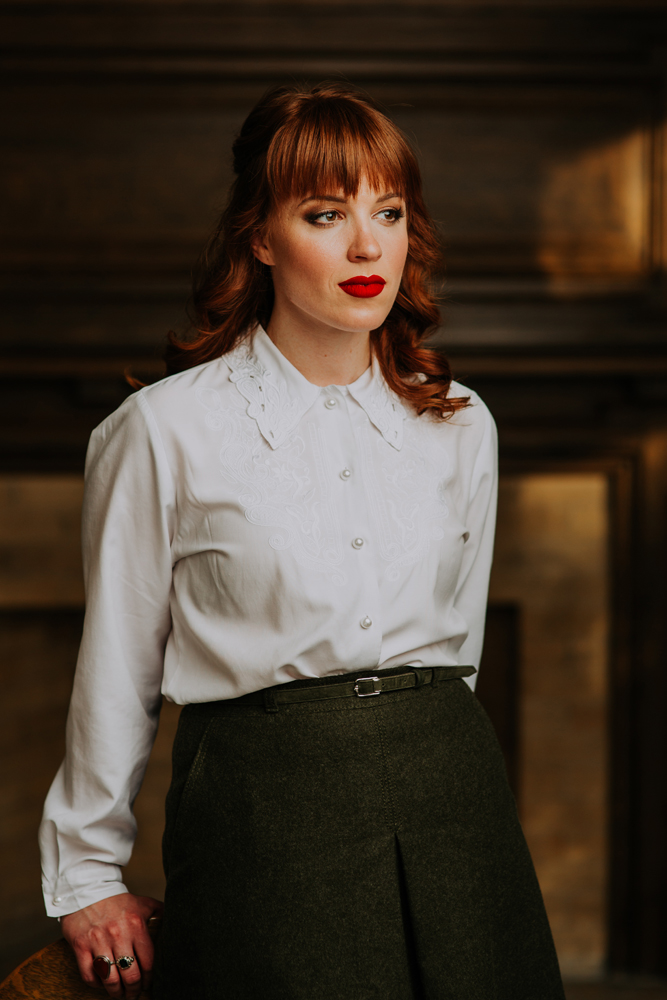
You wanted to prove yourself.
Ya. I didn’t want to become dependent on (grants), you never know when they’re gonna not be available. So I wanted to make sure I was sustainable. They do make a huge difference – I wouldn’t be where I’m at without them. But I wanted to not be fully dependent on them.
So we did the album in parts, January, March and May, which was kind of neat. I would do that again versus just one week in the studio, I actually really liked that. If I had the luxury of being able to do it that way again.
And you were you writing new songs throughout that recording process?
Yes, there’s nothing like recording a fresh song, ‘here’s my current take on the world and how I feel’ – that was cool, and that’s something I never really had a chance to do before. But I actually kind of had to write more throughout this project. When we first went into this recording together – Bears and I - we thought we’d re-record some of my Song Harvest Volume One songs with full band arrangements, but then that didn’t really make sense for a variety of reasons, so we went new and fresh. The newest ones written are some of my favourites on the album, they have that new spark and almost uncertainty to them.
Is there still a Song Harvest Volume Two planned?
Yes, I have ideas for it already. I’m very fortunate that I have a very supportive partner. (editor’s note: Megan got married this winter!) We both have big, big dreams. It’s a new chapter for us and I’m curious to see what our new home will bring, I’ve been fortunate to have a lot of creative spaces to write in, and can’t wait to see what this one has for me.
Are you actively engaging in continued learning and finding sources of inspiration? What’s driving your growth as an artist?
I feel like Orion (Paradis) was very much ‘come in, and be involved with the mixing.’ He wasn’t one of those people that insisted he had to do everything himself. So Bears, Orion and I all had influence on the final production of Seeker.
The mix on track Seeker was actually influenced by a scene from (TV show) Outlander – where Claire (the protagonist) is fleeing through the woods, twigs pulling at her hair. There’s a certain part of the song where I was like, ‘that needs to be out there like that – maybe even more than it should –it needs to catch at you, it needs to be a bit uncomfortable.’
As an Outlander fan, I totally get that visual.
That TV show influenced parts of the album. And I’ve always been really drawn to reading poetry – Leonard Cohen’s Book of Longing, Margaret Atwood’s work in general – especially The Edible Woman. I feel Bad Poetry is like my response to Edible Woman.
I draw influence from other people’s work – art, music – which is why I don’t want to be competitive with them. How do you draw influence if you’re trying to beat them? We’re all just trying to do good work, hopefully. It’s gotta be about the work. If you don’t find joy in writing and performing, it can be really draining.
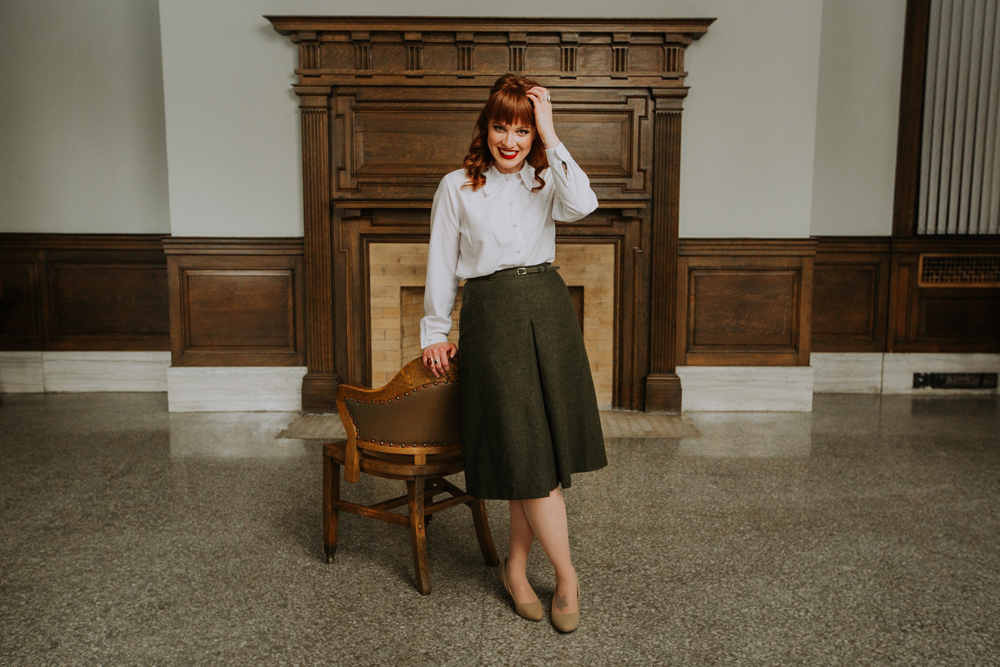
Do you feel like you will be pushing yourself for your next album to be even better?
God I hope so. That’s one thing I’ve enjoyed about having this career and lifestyle, is I’ve seen a progression within myself, and I think if I plateaued that would be a really sad day. I hope I keep getting better. I wanna keep growing and learning new things and having new life experiences. I don’t wanna become a writer that’s always writing about writing songs, or being on the road. I need to have other experiences. Life is neat - sometimes it’s like a hot mess garbage fire, but it’s also beautiful. I should be writing about that but also exploring my shadow self; a lot of my songs are about things I don’t like about myself.
When you were writing Seeker did you intentionally have a theme in mind, or, did a theme come out of it?
Seeker, that word is one I’ve struggled with over the years, especially growing up in a religious household and then coming to peace with the ideas and ideals I hold. If there is a theme, it is just that - seeking. I am an experience junkie – traveling, meeting new people, and having new experiences within my own current relationships. Getting married, that was a real trip. What a cool thing to do.
The song Seeker is all about having spiritual experiences that don’t necessarily look like spiritual experiences. I think throughout the whole album there are different highs and lows of my experiences so far. ‘Vampires’ is about being depressed, very very low, and then ‘Saturn’ is about astrology and being in love, and being at that stage in your life where you wanna make some big decisions – I’m totally there right now.
Do you have any words of advice to pass along?
I think in this age of social media, you need to be mindful of where you’re putting your likeness - which causes you align with. Take care of your mental health. This business can be quite gruelling. You need to take time for yourself, which is something I’m still trying to figure out.
Do you find that when you’re writing you’re more vulnerable to things, more open to feeling criticism?
I’m my own hardest critic, so anything I’d hear from outside is something I’ve already thought myself. I come from a very humble family, so I’ve really had to find my validation from within. At the end of a song I still hope there’s applause (laughs), but I’m trying to make songs that I like.
What’s helped you keep your own head on and stay focused?
Stay humble, but acknowledge your small successes. Be supportive of others in the scene. Be kind - that’ll get you a long way. I think some people think that there’s gonna be a fast track, but everyone’s career looks different. It’s neat seeing that even in Saskatchewan, no two artist paths look the same. Anytime anybody else from Sask gets a little bit of love, it helps other people. The spotlight then gets put on this province. I find that people who are really making careers out of it, those are often the first ones to support others.
You’ve now come off the album’s immediate release, what’s up next for you?
I’ve got some more video stuff in the works with Crushed Rockets. A big goal for me is to incorporate unique spaces, so for example, ‘Deer Head’ is full of locations in Moose Jaw, and ‘Bad Poetry’ was shot in Indian Head. I hope to keep doing that with upcoming music videos. Of course, more tours. Now there’s more people involved in behind-the-scenes strategy. It’s been a blessing to have a team, and there’s also a bit of me learning how to hand over my ‘baby’ to others.
My goals a year from now? Maybe a sweet opening slot for an artist I really love, a chance to really get inspired by them and their work. To keep touring. Hopefully my numbers show that people keep listening to the album. I want to stay busy – healthy busy.
I’m pretty happy with where I’m at - it’s been a great year. I played at major festivals in the States, I toured in five different countries, went to Europe for the first time, released an album on a new record label. I hope that I can continue to build a team full of people who are kind. Life’s too short to work with people who aren’t, and other opportunities will always come along. Only work with kind people.
More on Megan, including upcoming tour dates, can be found at www.megannash.ca.

